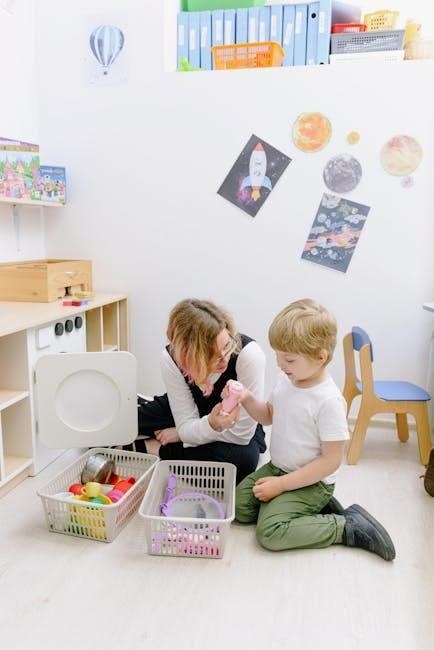
Welcome to the Back to School Guide! This section provides essential tips and strategies to help students, parents, and educators prepare for a successful academic year. From organizing routines to setting goals, we cover it all to ensure a smooth transition and a productive learning experience.
Preparing for the New School Year

Preparing for the new school year involves a combination of organization, goal-setting, and mental readiness. Start by reviewing last year’s performance to identify strengths and areas for improvement. Create a study plan that outlines daily and weekly goals, ensuring it’s realistic and achievable. Organize your school supplies and digital tools, such as planners or apps, to streamline tasks. Develop a routine that balances academics, extracurricular activities, and relaxation to maintain a healthy work-life balance. Additionally, familiarize yourself with new technologies or tools that can enhance learning, such as AI-powered study aids or educational apps. Setting clear academic goals will help you stay focused, while maintaining open communication with teachers and classmates fosters a supportive environment. Finally, prioritize health and wellness by establishing proper nutrition and sleep habits to ensure you’re physically and mentally prepared for the challenges ahead. A well-prepared start sets the foundation for a successful school year.
Creating a Study Plan
Creating a study plan is essential for academic success, helping you manage time effectively and stay focused on your goals. Start by assessing your strengths and weaknesses to identify areas that require extra attention. Set specific, measurable, achievable, relevant, and time-bound (SMART) goals for each subject. Allocate dedicated blocks of time for studying, reviewing, and practicing, ensuring a balance between different subjects. Incorporate active learning techniques, such as summarizing key points or teaching concepts to others, to enhance retention. Use digital tools like calendars or apps to track progress and stay organized. Regularly review and adjust your plan to accommodate new topics or unexpected challenges. Consistency is key, so establish a routine that works for you and stick to it. A well-structured study plan not only reduces stress but also maximizes productivity, helping you achieve your academic objectives. Remember, flexibility is important—be ready to adapt your plan as needed throughout the year.
Organizing Your School Routine
Organizing your school routine is crucial for maintaining productivity and reducing stress; Start by creating a detailed schedule that includes class times, homework sessions, and breaks. Use a planner, digital calendar, or app to stay on track and set reminders for upcoming deadlines. Prioritize tasks based on importance and urgency, focusing on completing high-priority assignments first. Establish a dedicated study space free from distractions, where you can concentrate effectively. Incorporate time-blocking to allocate specific periods for each activity, ensuring a balanced distribution of effort across subjects. Regularly review and adjust your routine to adapt to changing demands, such as exams or projects. Utilize tools like to-do lists or task management apps to break down larger tasks into manageable steps. Consistency is key, so stick to your routine as much as possible while allowing flexibility for unexpected events. A well-organized routine helps you manage your time efficiently, achieve your goals, and maintain a healthy work-life balance throughout the school year.
Setting Academic Goals
Setting academic goals is a powerful way to guide your efforts and track progress throughout the school year. Start by identifying clear, measurable objectives that align with your long-term aspirations. Break these goals into smaller, manageable steps to maintain focus and motivation. For example, if your goal is to improve grades, set specific targets for each subject or assignment. Use the SMART framework—Specific, Measurable, Achievable, Relevant, and Time-bound—to ensure your goals are well-defined. Regularly review and update your goals to reflect your progress and evolving priorities. Celebrate small victories to stay motivated and adjust strategies as needed. Writing down your goals and placing them in visible locations can reinforce commitment. Maintaining a growth mindset and seeking support from teachers or peers will also help you stay on track. By setting and working toward academic goals, you can build confidence, develop resilience, and achieve lasting success in your educational journey.
Tips for Parents to Support Their Children
Parents play a vital role in their children’s academic success. Start by creating a study-friendly environment at home, ensuring your child has a quiet, well-lit space for homework and reading. Establish a consistent daily routine that includes time for schoolwork, physical activity, and relaxation. Communicate openly with teachers to stay informed about your child’s progress and any challenges they may face. Encourage your child to ask questions and seek help when needed, fostering a growth mindset. Monitor their assignments and offer guidance without doing the work for them, helping them develop problem-solving skills. Attend school events and parent-teacher conferences to show your support and engagement. Praise their efforts and celebrate achievements, no matter how small, to build confidence. Finally, promote a healthy lifestyle, including proper nutrition, regular exercise, and adequate sleep, to support their overall well-being and academic performance.
Essential School Supplies
Having the right school supplies is crucial for a successful academic year. Start with the basics: notebooks, binders, and folders to keep assignments organized. A set of pens, pencils, highlighters, and erasers are must-haves for daily use. A backpack or tote bag is essential for carrying books and supplies comfortably. Include a calculator for math classes and a planner or calendar to track deadlines and appointments. For younger students, crayons, markers, and glue sticks are also necessary. Don’t forget a set of extra supplies, like tissues and hand sanitizer, to keep your child prepared. Consider investing in reusable items like lunch boxes and water bottles to promote sustainability. For older students, a laptop or tablet may be required for digital learning. Ensure all supplies are labeled with your child’s name to prevent loss. Finally, check the school’s supply list for specific requirements, as some classes may need specialized materials like lab goggles or art supplies.
Choosing the Right Backpack
Selecting the right backpack is essential for comfort and functionality. Look for one made from durable materials like nylon or polyester, with padded shoulder straps and a reinforced back panel for support. Ensure it has multiple compartments to keep books, a laptop, and small items organized. A water-resistant lining can protect belongings from spills or rain. Consider the size—too large may encourage overpacking, while too small may not fit essentials. Adjustable straps are crucial for a proper fit, regardless of the wearer’s height. Reflective details can enhance visibility for safety. Additionally, check for features like USB ports or built-in chargers for tech-savvy students. Finally, choose a design that aligns with your child’s style preferences to encourage daily use. A well-chosen backpack can make the school day easier and more enjoyable.
Must-Have Stationery Items
Equipping your child with the right stationery ensures they’re prepared for daily school tasks. Essential items include a sturdy notebook or binder for notes, a set of durable pens and pencils, and a reliable eraser. A pencil sharpener and ruler are also must-haves for precise work. Highlighters can help organize notes, while a glue stick and scissors are perfect for crafts. Don’t forget a set of colorful markers for creative projects. Sticky notes are great for reminders, and a folder or binder with dividers keeps work organized. A calculator is vital for math classes, and a lunch box or water bottle ensures they stay refreshed. Finally, a set of flashcards can aid in studying. These items create a solid foundation for a successful school year, fostering organization and readiness for any assignment.
Budget-Friendly Shopping Tips
School shopping doesn’t have to break the bank! Start by making a list of essentials and stick to it to avoid impulse buys. Shop during back-to-school sales or use coupons for discounts. Consider buying generic or store-brand items, as they often offer the same quality at a lower price. Reuse last year’s supplies, like folders or pencil cases, if they’re still in good condition. Purchasing in bulk with friends or family can also lower costs. Additionally, involve your child in the planning process to teach them the value of budgeting. Online retailers often offer deals, so compare prices before making a purchase. Finally, prioritize needs over wants to ensure you stay within your budget while still getting everything your child needs for a successful school year.
Digital Tools for Learning
Digital tools have become essential for modern learning, offering students and educators innovative ways to enhance education. Platforms like Google Classroom and Microsoft Teams provide seamless communication and assignment management. AI tools such as ChatGPT can assist with essay drafting, problem-solving, and study tips. Educational apps like Khan Academy and Duolingo offer interactive lessons for various subjects. Digital organizers like Trello and Notion help students manage tasks and deadlines efficiently. Online resources such as Grammarly improve writing skills, while tools like Hemingway Editor simplify complex texts. Additionally, cloud storage services like Google Drive and Dropbox ensure access to files from any device. When using these tools, focus on productivity and avoid distractions. By leveraging these technologies, students can streamline their learning process, stay organized, and achieve academic success. Always explore new tools to find what works best for your learning style and goals.
Strategies for Academic Success
Achieving academic success requires a combination of effective strategies and consistent effort. Start by setting clear, achievable goals and breaking them into manageable tasks. Develop a study routine that includes active learning techniques, such as summarizing notes in your own words or teaching concepts to others. Utilize digital tools like ChatGPT for drafting essays or solving complex problems, but ensure you understand the content to avoid plagiarism concerns. Practice time management by prioritizing tasks and avoiding procrastination. Engage actively in class, ask questions, and seek help when needed. Regularly review and organize your notes using methods like mind mapping or the Cornell note-taking system. Stay curious and embrace challenges as opportunities to grow. Cultivate critical thinking by analyzing information and evaluating sources. Finally, maintain a healthy work-life balance to stay motivated and focused. By implementing these strategies, you can enhance your learning experience and achieve your academic goals effectively.
Active Learning Techniques
Active learning involves engaging with material in meaningful ways to enhance understanding and retention. One effective technique is to teach the concept to someone else, which clarifies your own knowledge. Participate in class discussions, ask questions, and collaborate with peers on group projects to deepen comprehension. Hands-on activities, such as experiments or creative projects, also foster engagement. Self-quizzing is another powerful method—test yourself on key concepts to identify gaps in your understanding. Additionally, using flashcards or summarizing notes in your own words can reinforce learning. Incorporate technology, like educational apps, to make studying interactive and fun. Active learning encourages critical thinking and problem-solving, making it easier to apply knowledge in real-world situations. By staying proactive and involved, you can transform passive reading into dynamic learning experiences that yield better academic outcomes.
Effective Note-Taking Methods
Effective note-taking is a cornerstone of academic success, helping students retain and understand information better. The Cornell Note-Taking System is a popular method, involving divided columns for notes and summaries. Another approach is mind mapping, which visually organizes ideas and connections. For lectures, the outline method works well, focusing on key points and subpoints. The charting method is ideal for detailed, structured information, such as timelines or comparisons; Using symbols, abbreviations, and consistent formatting can make notes clearer and quicker to review. Incorporate active reading techniques, like highlighting and underlining, to engage with the material. Review and organize notes within 24 hours to reinforce memory. For digital notes, tools like Evernote or OneNote offer tagging and search features for easy access. Experiment with different methods to find what works best for you, ensuring your notes are concise, organized, and easy to review for exams or assignments.
Time Management Skills
Mastering time management is crucial for balancing academic responsibilities and personal life. Start by prioritizing tasks using the Eisenhower Matrix, focusing on urgency and importance. Create a detailed schedule, allocating specific time blocks for studying, assignments, and breaks. Use digital calendars or planners to stay organized and set reminders for deadlines. Break larger tasks into smaller, manageable steps to avoid overwhelm and track progress. Minimize distractions by designating a quiet, organized study space. Regularly review and adjust your schedule to ensure it aligns with your goals and workload. Incorporate time-blocking techniques to dedicate focused periods to specific subjects or activities. Avoid procrastination by using the Pomodoro Technique, which involves 25-minute work intervals followed by short breaks. Additionally, leverage tools like Google Sheets or task management apps to streamline your workflow. By consistently practicing these strategies, you can enhance productivity, reduce stress, and achieve academic success. Effective time management is a skill that will benefit you throughout your life.
How to Seek Help When Needed
Recognizing when you need help is the first step toward success. Don’t hesitate to ask questions or clarification from teachers or peers during class. If you’re struggling with a concept, schedule one-on-one meetings with your instructors or tutors. Many schools offer academic support centers, such as writing labs or math tutoring, which can provide additional guidance. Join study groups or online forums where you can collaborate with classmates and share knowledge. Utilize online resources like educational apps, video tutorials, or interactive learning platforms to reinforce your understanding. If you’re feeling overwhelmed, reach out to school counselors for emotional or academic support. Remember, seeking help is a sign of strength, not weakness. By being proactive and resourceful, you can address challenges early and stay on track to achieve your goals. Always advocate for yourself and take advantage of the resources available to ensure your success. Don’t wait until it’s too late—ask for help when you need it most.
Health and Wellness

Maintaining physical and mental health is crucial for academic success. Start by ensuring you get regular exercise, such as walking, jogging, or participating in sports, to keep your body active and your mind sharp. A balanced diet rich in fruits, vegetables, lean proteins, and whole grains provides the energy needed for learning. Stay hydrated by drinking plenty of water throughout the day. Prioritize sleep by establishing a consistent bedtime routine, aiming for 7-9 hours of quality rest each night. Managing stress is equally important; practice mindfulness, meditation, or deep-breathing exercises to stay calm and focused. Regular health check-ups and vaccinations are essential to prevent illnesses. Foster positive relationships with friends and family to support emotional well-being. Schools often offer wellness programs, counseling services, and health resources—take advantage of these to maintain your overall health. Remember, a healthy body and mind are the foundation for a successful school year. By prioritizing wellness, you can perform at your best and enjoy a fulfilling educational experience.
Maintaining Physical Health
Maintaining physical health is essential for overall well-being and academic performance. Start with regular physical activity, such as walking, jogging, or joining a sports team, to keep your body active and energized. Incorporate strength training and flexibility exercises to build muscle and improve mobility. A balanced diet plays a key role in physical health; focus on consuming whole foods, fruits, vegetables, lean proteins, and whole grains. Avoid sugary snacks and drinks that can lead to energy crashes. Stay hydrated by drinking plenty of water throughout the day to support bodily functions. Regular health check-ups and vaccinations are vital to prevent illnesses and ensure optimal health. Additionally, practice good hygiene habits, such as washing hands frequently and getting enough rest, to avoid getting sick. By prioritizing physical health, you can maintain energy levels, avoid illnesses, and stay focused on your academic goals. A healthy body supports a healthy mind, making it easier to succeed in school and beyond.
Managing Mental Health
Managing mental health is crucial for students to thrive academically and emotionally. Start by practicing mindfulness and stress-reduction techniques, such as deep breathing exercises or meditation, to help manage anxiety and stay calm under pressure. Establish a daily routine that includes time for relaxation and hobbies to maintain a healthy work-life balance. Prioritize sleep by setting a consistent bedtime schedule, as lack of sleep can significantly impact mental well-being. Encourage open conversations about feelings and challenges with friends, family, or counselors to build a support system. Avoid overwhelming yourself with too many commitments; learn to say “no” when necessary. Incorporate physical activity, such as yoga or walking, to boost mood and reduce stress. Stay connected with loved ones and engage in activities that bring joy and fulfillment. If struggles persist, don’t hesitate to seek professional help. By taking proactive steps to manage mental health, students can create a positive foundation for their school year and beyond.
Importance of Proper Nutrition
Proper nutrition plays a vital role in a student’s overall health and academic performance. A balanced diet ensures that the body and mind receive the necessary fuel to function optimally. Incorporate a variety of nutrient-rich foods, including lean proteins, whole grains, fruits, vegetables, and healthy fats, to support energy levels and brain function. Avoid sugary snacks and processed foods that can lead to energy crashes and decreased focus. Encourage healthy eating habits by preparing meals in advance or packing nutritious lunches and snacks for school. Staying hydrated is equally important, as water helps maintain concentration and physical health. Teaching children the importance of nutrition early on can foster healthy habits that last a lifetime. By prioritizing proper nutrition, students can maintain their physical and mental well-being, leading to better academic outcomes and a stronger foundation for future success.
Establishing Good Sleep Habits
Establishing good sleep habits is essential for both physical and mental health, especially during the school year. Aim for 8-10 hours of sleep each night to ensure proper cognitive function and memory consolidation. Create a consistent sleep schedule, going to bed and waking up at the same time daily, even on weekends. Develop a calming bedtime routine, such as reading a book or taking a warm bath, to signal your body it’s time to rest. Avoid screens like phones, tablets, or computers at least an hour before bed, as blue light can disrupt sleep patterns. Create a sleep-friendly environment by ensuring your bedroom is dark, quiet, and cool. Limit caffeine and sugary snacks in the evening, as they can interfere with sleep quality. Encourage physical activity during the day to promote better sleep at night. By prioritizing sleep, students can improve focus, boost energy levels, and perform better academically. Healthy sleep habits lay the foundation for a successful and productive school year.
Technology in Education
Technology plays a vital role in modern education, transforming how students learn and engage with academic material. Tools like ChatGPT and Google Sheets can enhance research, data analysis, and collaboration. Online learning platforms offer flexible access to courses, enabling students to learn at their own pace. Educational apps provide interactive learning experiences, making complex concepts easier to understand. Digital tools also promote organization, with features like shared documents and virtual calendars helping students manage assignments and deadlines effectively. Additionally, technology fosters creativity through multimedia projects and presentations. To maximize its benefits, encourage responsible use of AI for research and brainstorming, while ensuring original work. By integrating technology thoughtfully, students can develop essential skills for the digital age, improving academic performance and preparing for future careers. Embrace technology as a powerful resource to enhance learning and stay ahead in an ever-evolving world.
Educational Apps for Students
Educational apps are revolutionizing learning by providing interactive and accessible tools for students. Apps like Khan Academy, Duolingo, and Photomath offer personalized lessons in various subjects, making complex topics easier to grasp. These platforms often include quizzes, videos, and exercises to engage users and track progress. Many apps are designed for specific learning styles, catering to visual, auditory, and kinesthetic learners. For instance, Duolingo gamifies language learning, while Khan Academy provides in-depth video tutorials. Additionally, apps like Toca Life and ABCmouse offer creative and fun ways for younger students to explore subjects like science and art. With features like offline access and customizable learning plans, these tools empower students to learn at their own pace. By incorporating educational apps into their routine, students can supplement classroom learning, improve retention, and develop a love for learning. These resources are invaluable for making education enjoyable and effective in today’s digital age.

Online Learning Platforms
Online learning platforms have become essential tools for modern education, offering a wide range of courses and resources to suit diverse learning needs. Platforms like Coursera, Udemy, and edX provide access to high-quality courses from top universities and experts worldwide. These platforms often feature interactive lessons, quizzes, and forums, fostering engagement and collaboration. Many platforms cater to specific interests, such as coding, language learning, or creative skills, making them versatile for students of all ages. For example, Khan Academy and Google Classroom are popular for K-12 education, while tools like Skillshare focus on practical skills. Additionally, platforms like DeepSeek API and Gemini offer advanced features for research and content discovery, enhancing the learning experience. By leveraging these resources, students can explore new subjects, gain practical knowledge, and develop skills at their own pace. Online learning platforms are transforming education by making it more accessible, flexible, and personalized, ensuring that students can thrive in a digital world.
Cybersecurity Tips for Students
As students increasingly rely on digital tools for learning, cybersecurity becomes a critical aspect of their academic journey. Protecting personal information and devices is essential to avoid potential threats. Start by using strong, unique passwords for all accounts and enable two-factor authentication (2FA) where possible. Be cautious when connecting to public Wi-Fi, as it can expose your data to risks. Regularly update your software and devices to ensure you have the latest security patches. Additionally, avoid opening suspicious links or downloading attachments from unknown sources, as they may contain malware. Educate yourself about phishing scams, which often target students through fake emails or messages. Use reputable antivirus software and consider using a virtual private network (VPN) for added privacy. Finally, back up your important files regularly to prevent data loss. By following these cybersecurity tips, students can safeguard their digital lives and focus on their studies without unnecessary interruptions or risks.



